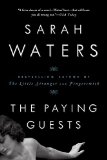Sarah Waters' Literary Influences
This article relates to The Paying Guests

Sarah Waters' The Paying Guests belongs to an unusual mixture of genres. Here is a partial pedigree of the literary influences on its style and content:
First Half
- Postwar novels
As in the novels of Elizabeth Bowen and Elizabeth Taylor, Waters shows how the interwar period was a crossroads for women, with barriers of sex and class becoming less rigid. In the tradition of those female realist writers, she "use[s] the domestic novel to grapple with the intricacies of a broken civilization and the reconfiguring of gender and social roles it entails." (Rachel Cusk's review for The Guardian.) Cusk goes so far as to call The Paying Guests a pastiche, with Frances "a kind of riddling Bowen-esque heroine."
- Edwardian class studies
There are definite echoes of the delicate class studies of E. M. Forster here, especially his Howards End, which has as a main character a lower-class insurance clerk named Leonard Bast – a remarkably similar name and character to Waters' Leonard Barber. The first line of The Paying Guests, "The Barbers had said they would arrive by three," also echoes the matter-of-fact opening of a sophisticated Virginia Woolf novel: "Mrs. Dalloway said she would buy the flowers herself."
- George Gissing
That this lesser-known Victorian novelist has a novella entitled The Paying Guest (1895) can hardly be a coincidence; after all, Waters gave his New Grub Street the #4 spot on a list of her top 10 Victorian novels for The Guardian. The middle-class Mumfords, who live in London's suburbs, take on as a lodger a young woman of lower class named Louise. "It wouldn't be nice if people said that we were taking lodgers," Emmeline Mumford complains. "It's a very common arrangement nowadays, you know; they are called 'paying guests,'" her husband Clarence replies. Emmeline agrees to the plan but still worries, "Oh, how I hope she isn't vulgar!" Ultimately, Gissing's novella is a satire and ends in comedy, but not before some romantic misunderstandings and disasters. In a letter he dismissed it as "a poor little book" and a "frothy trifle" – but, luckily, the same is not true of Waters' homage.
Second Half
- Victorian sensation fiction
Despite the conventional image of the Victorians as uptight prudes, they produced plenty of scandalous tales. This genre, known as the "sensation novel," included the works of M. E. Braddon, Sheridan LeFanu and Wilkie Collins, among others. Their works are full of melodramatic turns of events; adultery, disappearances, murder, mistaken identity, insanity, and poisonings are just a few of the shocking elements that recur. Waters has admitted (in a Guardian article) that her third novel, Fingersmith, is a conscious tribute to the genre, and there are traces of it here as well.
- True crime
In an author's note at the end of the text, Waters acknowledges her debt to accounts of high-profile British criminal trials from the 1920s and 1930s, especially that of Edith Thompson and Frederick Bywaters. (Readers are advised not to learn too much about that case beforehand, lest it spoil the plot).
Filed under Books and Authors
 This "beyond the book article" relates to The Paying Guests. It originally ran in September 2014 and has been updated for the
September 2015 paperback edition.
Go to magazine.
This "beyond the book article" relates to The Paying Guests. It originally ran in September 2014 and has been updated for the
September 2015 paperback edition.
Go to magazine.
Membership Advantages
- Reviews
- "Beyond the Book" articles
- Free books to read and review (US only)
- Find books by time period, setting & theme
- Read-alike suggestions by book and author
- Book club discussions
- and much more!
-
Just $60 for 12 months or
$20 for 3 months.
- More about membership!

![]() This "beyond the book article" relates to The Paying Guests. It originally ran in September 2014 and has been updated for the
September 2015 paperback edition.
Go to magazine.
This "beyond the book article" relates to The Paying Guests. It originally ran in September 2014 and has been updated for the
September 2015 paperback edition.
Go to magazine.